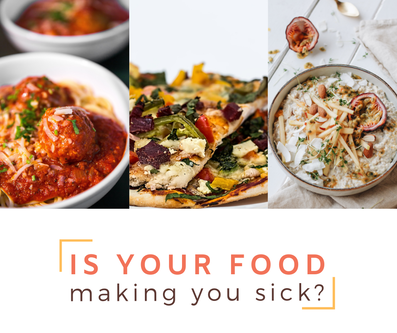 You’re careful about your health. You do your best to eat well, and you pay attention to the ways that your diet affects your energy levels....but something seems off. You’re experiencing annoying symptoms that you can’t explain. You’re often gassy and bloated, your skin may not be clear and glowing anymore, you may be ready for a nap after a meal and you wish you could remember where you put your keys. Why does your memory feel so foggy? These issues are frustrating (and often embarrassing) and they’re also very common. Many patients that come to see me are already living a fairly healthy lifestyle, but are baffled by continuing digestive issues, mysterious rashes, and low energy levels. If this sounds familiar, it may be time to take a good look at your diet. Even a “healthy” food can make you sick if your body is sensitive to it, even if you're eaten it your whole life without issues until now. For many, the food mystery becomes both frustrating and overwhelming when trying to understand what foods are nourishing you and not making you feel terrible. The good news is that you may not have to look very far to make changes that relieve your symptoms. With a bit of detective work, and a bit of help, you can map out a dietary plan that restores your well being. What are the Symptoms of Food Sensitivity? Food sensitivities can be tricky to diagnose. Symptoms can vary widely from person to person and can even be different depending on what else is happening in your body. For example, you might respond differently at different stages of your menstrual cycle, or if you’ve been under more stress or not sleeping as well. Food sensitivities can cause or contribute to:
Another reason why a food sensitivity is often a missed diagnosis is that these symptoms can be delayed up to 72 hours after a meal, so many people don’t make the connection between what they ate and how they feel. Even the most incredibly observant people can find it difficult to notice that they feel brain fog 3 days after eating a “normal” food. Similarly, it’s difficult to measure how many people suffer from food sensitivities because a lot of us don’t seek medical help, figuring that it’s “normal” to feel gassy and tired all of the time. In fact, conventional medical practitioners can be skeptical about food sensitivity symptoms, which can lead to frustration for patients. But it doesn’t have to be this way. What Causes Food Sensitivities? It’s important to recognize the difference between food allergies, food intolerances, and food sensitivities. Food allergies are immune reactions. After eating a certain food, your body’s immune system launches an attack by making its own protein, called immunoglobulin E (IgE). The next time you consume that food, your body is ready to attack again. The IgE causes your body to release a chemical called histamine, which triggers the physical symptoms of an allergic reaction. This is the type of allergy reaction one has to pollens and dander. With food, it can cause frightening anaphylaxis reactions. A food intolerance occurs when the body loses the ability to produce a certain digestive enzyme. Lactose intolerance occurs when the body cannot produce the lactase enzyme, and fructose intolerance occurs when a body cannot produce the fructase enzyme. Eating foods with lactose or fructose will then cause gas/bloating and diarrhea to occur (and can be a sign of Small Intestinal Bacterial Overgrowth).. A food sensitivity reaction occurs when you eat a food and it forms an antigen/antibody reaction. That is, a different part of your immune system binds to the food, the IgG reaction. Those immune complexes can cause intestinal and systemic problems in the body and mind. There are specialty labs that can detect this reaction. In our practice, we use Alletess Labs to identify these reactions.... and one blood draw can uncover up to 184 food sensitivity reactions! If we continue to eat that food sensitivity, the lining of the gut can become inflamed and damaged. Eventually, it can become permeable, so the undigested material “leaks” into the bloodstream. Not surprisingly, this is called “leaky gut” syndrome or intestinal hyperpermeability. What is the root cause of food sensitivities? And why are they becoming increasingly common? There are many medical reasons:
Which Foods Can Cause Food Sensitivities? Uncovering food sensitivities is a fantastic reason for seeing a Naturopathic Doctor – we have the tools to help identify if a particular food is making you sick. In addition, medical supervision can ensure your approach to food remains healthy and balanced. Research suggests that food sensitivities can be a trigger for disordered eating in some people. After all, if food is causing you pain, but you’re not sure which foods are to blame, it’s easy to associate your diet with negative experiences. How Can You Treat Food Sensitivities? At our office, we identify and address foods sensitivities with this approach:
Sometimes food sensitivities are only the tip of the iceberg and we have to go deeper and look to other causes of your symptoms. You can read more about that here. Uncovering food sensitivities is a truly a game-changer for many of our patients. If you suspect that something is off, I would love to offer you a complimentary Health Discovery session to see if our approach is right for you. Sources:
3 Comments
 Pain, swelling, redness, immobility and heat -- these are all common signs of inflammation with injuries or an infection. Chronic inflammation also occurs inside our body and can present itself in other ways. When inflammation triggers sensory nerve endings, it can result in symptoms such as fatigue, rashes, and chest, abdominal and joint pain. What is Inflammation? Inflammation is a natural function with a bad reputation. It’s a word most of us associate with pain, discomfort and poor health -- yet its ultimate purpose is actually to help us. Without inflammation, injuries could fester and infections could become deadly. When the body is injured, inflammation is a signal to the immune system to send white blood cells so the healing process may begin. Unfortunately, when inflammation continues on for too long, it can potentially trigger numerous other chronic health issues in the body including cancers, depression, food sensitivities and asthma. In fact, some say inflammation is the “new cholesterol” due to its direct link to heart disease. In some cases, inflammation occurs when the immune systems revolts against us and attacks our own bodies. Autoimmune diseases include rheumatoid arthritis, type 1 diabetes, IBD, among dozens of others. There are over 80 different autoimmune diseases. Top Tips to Reduce Inflammation First, let’s take a quick look at inflammatory foods that you definitely don’t want to put into your body. You probably already know all the usual suspects by name – sugar and artificial sweeteners, fried foods and saturated fats, processed meats and grains, dairy, caffeine and alcohol. These foods can disrupt gut bacteria, spike insulin levels, and bolster inflammation. Identifying and eliminating your food sensitivities via IgG Blood testing or an elimination diet can be a very helpful next step. Wondering what those anti-inflammatory foods are? The good news is they are delicious. 1. Eat Raw, Organic Fruits & Veggies Organic foods are a great place to start when looking to adhere to a more anti-inflammatory diet. Grown in mineral-dense soil, organic foods tend to be more alkalizing and have a higher vitamin and mineral content. In order to keep those vitamin and mineral levels high, it’s also helpful to eat raw fruits and veggies, which are also known as life-giving foods. Cooking can deplete minerals, which is why it’s important to take every opportunity you can to get eat fresh and raw so you get to enjoy the full nutritional benefits. For example, Vitamin K is found in dark leafy greens like broccoli and spinach, and is excellent for reducing inflammation. 2. Add in lots of Alkaline foods In addition to fruits and vegetables, nuts and legumes are also alkaline foods that can help balance your pH and reduce acidity. While being mindful of your body’s pH, you might be wonder about the impact of acidic foods, like tomatoes or citrus, and how they affect inflammation. Surprisingly these foods don’t create acidity in the body. Instead they may actually help to restore your pH balance. Even apple cider vinegar is alkaline-forming (however, other vinegars are not). 3. Fish & Plant Proteins Believe it or not, most high protein foods, like meat, can actually be acid forming. In this case, plant proteins, such as almonds and beans, are great alternatives to reduce acidity and inflammation. Need your meat? Then eat more fish. Fish oils, as well as other foods rich in healthy fats like omega 3, are proven to have a variety of health benefits, including significant anti-inflammatory effects. Fish is also a great source of Vitamin D. Vitamin D deficiency has been associated with a wide range of inflammatory conditions. Grass-fed meats are a good option if you prefer red meat, due to their higher concentration of conjugated linoleic acid and omega 3s. 4. Antioxidant-Rich Foods Those susceptible to chronic inflammation may also benefit from supplementing their diets with food sources that contain bioactive molecules. For example, curcumin is the compound found in turmeric root that gives curry its bright yellow color. A powerful antioxidant, curcumin’s ability to reduce brain inflammation has been shown to be beneficial on both Alzheimer’s disease and major depression. Curcumin has been shown to not only prevent memory problems from worsening, but also to improve them. Complement your curry with a little watercress salad on the side, including pears, dill weed, onion and chives – all sources of the antioxidant known as isorhamnetin. Add a little red wine and some berries for dessert, which are rich in resveratrol, and you’ve got yourself an anti-inflammatory party. Resveratrol is an antioxidant produced by certain plants in response to injury or when under attack by bacteria or fungi. This is what makes dark-coloured grapes and berries such excellent health boosters for your body. And of course, you can’t forget the dark chocolate! The flavonoids found in cacao are extremely potent antioxidants and anti-inflammatory agents, which are great for your brain and your heart. New research also shows that consuming dark chocolate with a high concentration of cacao (minimum 70% with 30% organic cane sugar) has a positive effect on stress levels and inflammation, while also improving your memory, immunity and mood. You read that right – chocolate really is good for you (but make sure its good quality and that you are not over doing it). 5. Going Beyond Diet- get your stress in check! While diet definitely plays a role, stress is also a major contributor to inflammation in the body. Stress can be triggered by lack of sleep, lifestyle changes, or any other number of factors. Getting a good night’s rest and making time to meditate or practice other stress-reducing activities, like yoga or Tai chi, are also very effective ways to promote good health and reduce inflammation. All it takes is a few conscious decisions about your diet and lifestyle and you are on your way to a healthier you.
Please feel free to contact our clinic and we can find your best solutions together. Call or book your complimentary Health Discovery session at 519-275-2187 ext. 7 or book online. In health, Dr. Keila Roesner BHSc ND
References
 "Dr. K, I'm doing great... except that I want to scratch my eyes out, my nose keeps running and I'm going to start charging that frog in my throat rent!" lamented one of my patients this week. And she isn't alone. Seasonal allergies affect 1 in 25 Canadians, according to the Canadian Allergy, Asthma and Immunology Foundation. Allergic rhinitis, or "hay fever", or these damn allergies can present as watery itchy eyes, runny nose with clear mucous, sinus congestion and pressure, itchy tongue and palate, a dry scratchy throat, feeling fatigued, poor concentration. This means lower productivity at work, an increased risk of asthma and an expensive trip to the pharmacy or health food store trying to find relief. Windsor and Toronto are some of the worse cities in Canada to live in with respect to pollution and ragweed. Here in Stratford, we are surrounded by a lot of farmland and trees, which also translates to pesticides and tree pollen. Despite being convenient for travel, this Highway 401 corridor that I and my patients call home can cause some decided health issues from early spring until late fall. So what's an allergy sufferer to do? 1. Catch the culprit Most seasonal type allergies are IgE-mediated immune reactions. A simple skin or blood test can be ordered by your family doctor or Naturopathic Doctor to determine the cause of your symptoms. Common culprits are tree pollens, ragweed, moulds, and dust mites. These can be made worse by certain foods, particularly food sensitivities. 2. Support your immune system Eat a diet high in fresh fruits and vegetables for lots of Vitamin C, good quality probiotics recommended by your health care provider, fermented foods like kombucha, sauerkraut or kefir, and healthy fats. Minimize sugars, processed foods and alcohol as they will suppress your immune function and can contribute to mucous production. 3. Create a customized plan Your family doctor or allergist might also recommend avoiding the allergen if possible, antihistamines or decongestants. Please be aware that decongestant nasal sprays often cause rebound congestion once you discontinue their use, so these should only be used short-term. In my practice, I recommend an individualized supplement program including homeopathics, and nutraceuticals, dietary support and at-home care. I like to recommend using a neti pot filled with a warm sterile saline solution to rinse out the sinuses twice daily during allergy season. It really works! BONUS I also recommend Allergy Booster "shots" preventatively for patients that predictably experience symptoms at this time of year. A simple, low-cost oral solution that can help to improve our immune function and reduce the severity, this is one of my favorite ways to stay on top of allergies. Many of my patients have experienced a dramatic improvement in their allergy symptoms after only a few doses and no longer need to rely on allergy medication. If you or your loved ones are suffering from seasonal allergies, you can book a free 15 minute health strategy session to learn more about treating your allergies.. naturally. In health, Dr. Keila |
Top 75 Naturopath Blogs & Websites For Naturopathic DoctorsAuthorDr. Keila Roesner is a Naturopathic Doctor. When not treating patients she is also an enthusiastic barefoot-strolling, music-loving, yoga-doing kitchen wiz - who also happens to be a wrestling fan. Categories
All
|
Let us take you from hormonal to whole.
|
Dr. Keila Roesner, BHSc ND
Naturopathic Doctor, Hormone Warrior and Your Wellness Cheerleader 247 Church Street, Stratford ON N5A 2R7 (519) 273-0900 [email protected] |
|





 RSS Feed
RSS Feed